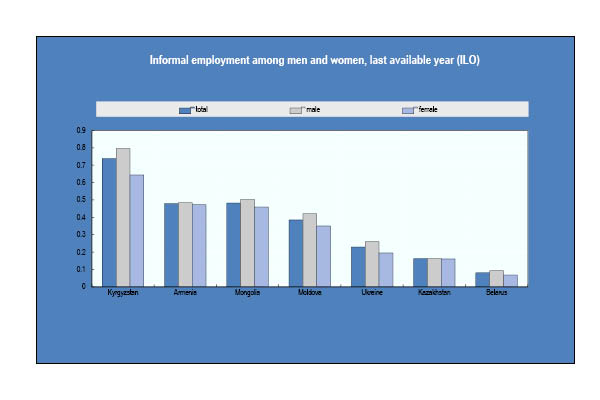Informality in Eurasia
COVID-19 and informality in Eurasia
 |
COVID-19 has triggered an economic and public health crisis that has had a particularly severe effect on informal businesses and workers in a region where they have historically represented a large share of the economy (up to half of GDP in several countries). The informal sector has previously acted as a social buffer in times of crisis, and has been a source of resilience for many precarious workers in transition economies. For many in the region, informal economic activity has provided subsistence revenues, flexible arrangements and opportunities for vulnerable workers and businesses alike. COVID-19 is different. Many of the key arenas for informal work were among the first to be hit by the crisis: governments had to close market places and implement strict containment and social distancing measures. Many informal workers were left with nothing to fall back on. Migrants had to return home or remain without work in their countries of destination, often with a loss of revenues in both cases. This had a significant impact on the region’s economies, which are heavily reliant on remittances. In addition, most government support programmes in the region focused on the formal sector, leaving the informal sector with little or no support. |
In its note, Informality and COVID-19 in Eurasia:The sudden loss of a social buffer, the OECD Eurasia Competitiveness Programme looks at the impact of the crisis on those who make their living in the informal economy in the region. The note also looks at how governments can address the short-term effects of COVID-19 on the informal sector and make use of the current momentum to advance business formalisation over the long term.
:
Informality and COVID-19 in Eurasia: The sudden loss of a social buffer
Firm inequality in Eurasia
For both historical and structural reasons, informality is a pervasive reality in the Eastern Partner region and Central Asia. Weaknesses in the business environment, limited opportunities in the formal private sector and shortcomings in the delivery of public services have encouraged firms and workers to operate in the informal sector or migrate to find work and escape poverty.
 |
|
COVID-19 has hit a region where informality was already a source of vulnerability, one where there is limited social protection for many who live there. Labour migrants were forced to return home, without earnings and support in their countries of origin. Lockdowns forced many informal workers and businesses to halt their operations, with many of their activities – such as agriculture, cross-border and intra-regional trade, transport, retail, catering and restaurants – ones where informality is common. With declining revenues, little savings and financial support, many faced no option other than continuing to work under precarious and unsafe conditions.
Previous Events
The sudden loss of a social buffer: COVID-19 and informality in Eurasia
Date: Webinar on 11 March 2021, 10.00 - 12.30 (GMT+1: France, Belgium, CET)
Tackling the informal economy has been an important concern for many of the region’s governments. Despite this stated objective, few governments have designed specific plans or policy responses to reduce the level of informality and help informal firms and workers transition to the formal sector. To support reform efforts towards reducing informality – in particular against the backdrop of the serious effects of COVID-19 on informal sectors across Eurasia – the webinar aimed to discuss immediate and long-term responses in supporting informal firms and workers, and eventually fostering business formalisation.
The webinar discussed a policy note prepared by the OECD Eurasia Division: The sudden loss of a social buffer: COVID-19 and informality in Eurasia. The note summarises the development of the informal sector in Eurasia, and the main challenges it faces following the onset of the COVID-19 pandemic. It also offers policy options to ensure a more inclusive and sustainable recovery for all.
Read a summary of the webinar l Краткое резюме вебинарa
Presentations from the webinar
The OECD and the informal economy
The OECD has been working on fighting the informal economy and supporting firm formalisation in OECD member and non-countries, particularly in Latin America and Southeast Asia. Building on its work on the Eurasia region with a focus on private sector development, the OECD Eurasia Division has analysed firm informality issues in the specific context of Afghanistan (full report available here) and has developed regional analysis on informality through a new policy note. On a topic that remains largely unaddressed, the OECD stands ready to further revise and apply its analysis and framework additional countries and help them promote business formalisation.
Key Contacts
|
Mr William Tompson Head of Division OECD Eurasia |
Mr Arnault Prêtet Policy Analyst and Deputy Head of Unit OECD Eurasia |
|
Mr Antti Rauhala Policy Analyst OECD Eurasia |
Ms Talisa Zur Hausen Policy Analyst OECD Eurasia |
Related Documents

